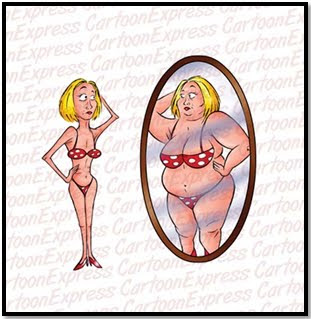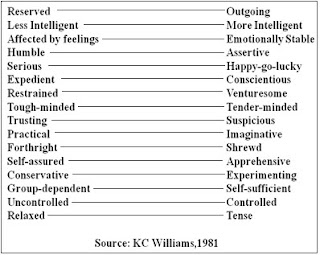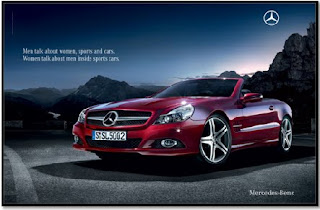Both personality and self concept are formed on the basis of the perceptions that we uphold of the environment around us, however although they share this main similarity there are a number of differences between the two.
Solomon (1999) describes personality as being a person's unique make up, which consistently influences the way the person responds to his or her environment. It can be generally difficult for individuals to distinguish a meaning for personality as there are so many interpretations as to what personality actually is and where it comes from.

Several theories have been introduced which individuals can use to identify and assess their qualities and sometimes weaknesses, an example of this is Myer - Briggs Type Indicator which measures the dominant preferences for taking in information and making decisions, however this is seen as not being completely accurate as some people may be 'a bit of both' from all the different profiles. The Myer's - Briggs Type Indicator is more of a measurement of abilities than a test, therefore there are not any right all wrong answers.
This personality test consists of several statements in which you have to identify two of the statements which most relate to you. After completing this it showed my personality type to be INTP which is the 'engineer'. It says that this personality type is very individualistic, reserved and curious. In relation to my myself this is somewhat true however, there are some aspects of my personality traits which were not shown within this profile and are predominately amongst some of the others.
Self concept is the way in which someone sees themselves or how they would like others to see them, however it doesn't always reflect reality sometimes the way you think you are isn't necessarily how others see or think of you, for example someone who prides themselves on being a good listener others may completely disagree with. People give themselves values based upon their self concept, it is how you evaluate your attributes and qualities. Self concept is made up of three different elements; self image. ideal self and self esteem.

Self image is a description of the kind of person we think we are, it usually compromises social roles, body image and personality traits. Ideal self is the type of person you aspire to be and not necessarily who you are, the larger the gap between your ideal self and you the lower your self esteem will be. Self esteem is related to your image and how happy you are with your self, for example the cause of someone with low self esteem could be due to them not approving of their own image which can lead to them being shy and less confident.
William James (1890) argued that self concept derives from social comparisons with others - peers, family and reference groups.
Here is a short clip that I have found which shows some of the issues related to self concept, including self image, ideal self and self esteem.
Solomon (1999) describes self concept as the beliefs a person holds about his or her attributes and how he or she evaluates those qualities. Therefore in this sense self concept can still be seen to play a part it personality in that, it looks at the aspects that create our qualities although these have more to do with the ones the we have created for ourselves.
All of these things can be used postively or negatively by marketers, for example designer brands, new clothes, jewellery can all be postive contributions to help boost someones self esteem and self image, unlike say plastic surgery which can be seen as a negative form of transformation as it doesn't necessarily make you feel happy and to what extent will someone need to go to make themselves feel happy within themselves and also with the role it plays on society.
Cattell's Trait Theory of Personality, looks at the individuals self concept. It consists of a list of two different types of characteristics which you are required to mark out of the two lists which are most like yourself. Here is the list of the two characteristic traits;

Brand personality is key for many organisations as they want to make sure that they have created the perfect image and personality to represent themselves and their products. for example if a company is known for being innovative, exciting and new they would be the ones that would be most successful in terms of selling products and increasing potential consumers. Aaker (1996) introduced the Relationship Basis Model which describes and measures the personality of a brand in five key dimensions; sincerity, excitement, competence, sophistication and ruggedness.

Sincerity within a brand personality involves being a brand that is down to earth, family orientated, genuine and old fashioned. The sort of brands that I would most associate with this personality type are brands such as Heinz, Hovis and Coca Cola etc, as these types are brands have been around for generations with many people having grown up with their products in their households. Also unlike more recent brands they have rarely changed their packaging and brand logo also some of these brands may be seen as iconic.

The excitement type of brand personality is one that is young, spirited, up-to-date, and outgoing. I think that brands such as Apple would most suit this personality as they are fairly new and innovative, they are always coming out with fresh new ideas reaching out to a younger more sophisticated and modern audience. Through the use of their music, imagery and products they give a sense of being 'cool' and being associated with them is seen as a positive thing within society.

Competence is a brand that is well accomplished, influential and competent, brands such as Hewlett Packarrd or IBM. Sophistication as a personality type is wealthy, pretentious and condescending. Car companies such as Mercedes and BMW are most associated with this type of personality as they are high end brands.

Ruggedness is a brand that is athletic and outdoorsy, brands that I think best suit this would be Adidas, Nike and Lacoste. This is because although there are many sport brands these are the top ones and all of which have had many associations with sporting events and sport icons. Adidas as a brand within its advertisements often associates itself with sports however sometimes they may not be as mainstream compared to other brands.

All in all I think that personality and self concept interlink with each over however, it is a determinant of the individual and their self esteem levels as to how much it will play apart in their characteristics and as to how much brands can influence them in their purchase decisions.
Gets better and better. Love all the examples offered
ReplyDelete